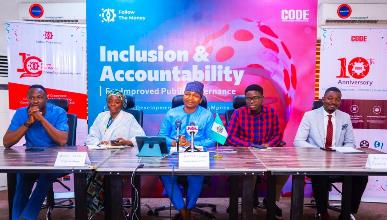A Civil Society Organisation, Connected Development (CODE), says observations from the just concluded Kenya election have revealed the need for the Independent National Electoral Commission (INEC) to adjust its voting hours for 2023 poll.
Mr Emmanuel Njoku, Director, Democracy and Governance, CODE said this at the official launch of CODE’s annual report that detailed its various interventions and effort to institutionalise accountability and transparency in governance across Africa.
Njoku said that INEC’s review of voting hours was recommended because if not done, more than 30 million citizens could be disenfranchised in the 2023 General Elections.
He said that this was because Kenya used the same Bimodal Voter Accreditation System (BVAS) device and also transmitted its results electronically just like Nigeria and the process was practically the same as the only difference was in the numbers.
He added that CODE was in Kenya to observe the election and to also see how the device would work so as to prepare for Nigeria’s election in 2023.
“Kenya’s voter register is just 22.1 million and the voter turnout was 65 per cent, which was about 14 million votes, in Nigeria we are expecting around 45 per cent voter turnout which is close to 40 million people.
“Yet Kenyan polls open as early as 6am and close by 5pm that is 11 hours for a voter register of just under 2.1 million what that means is that everybody gets to vote.
“However, people in Nigeria with higher voters’ polls open for just six hours from 8:30 and closes by 2:30pm that is just six hours for a voter register of 95 million people.
“With the BVAS, it takes a person two minutes to accredit and voting, mathematically, if it takes one person two minutes to go through the process to vote, it means in an hour, it will take just about 30 persons to vote,” he said.
Njoku added: “This is because if we go ahead with what we have, which is just six hours for 95 million persons to be able to get to vote, we may end up seeing close to 30 million Nigerians being disenfranchised in the 2023.
“Going forward, if Kenya with a voter registers of 22 million persons allows 11 hours for citizens to vote, INEC needs also to expand its voting time.”
Mr Hamzat Lawal, the Chief Executive Officer of CODE, said that the report launched revealed CODE’s activities of holding public officials accountable and demanding that they keep their promises to their constituents by expediting timely interventions.
Lawal said that in 2021, with support from Ford Foundation, CODE supported local leaders in Rivers grassroots in a campaign borne out of the need to combat pervasive corruption, poor accountability, and the negligence of community development.
He said that this have been amounting to years of under-development, exposure to hazardous health risks due to oil substance leakages into water supplies and the sheer impact of these on livelihoods and the quality of life.
He said that CODE visited 19 project sites in 10 communities in nine LGAs and as a result, so many abandoned projects were completed.
Lawal added that the World Bank has approved a 150million dollar credit for the Adolescent Girls Initiative for Learning and Empowerment (AGILE), to improve secondary education opportunities in the country.
He said that the AGILE project which was being carried out in 7 states would be implemented by the Ministry of Health in collaboration with Connected Development CODE, a Non-Governmental Organisation.
He said that the seven states were Kano, Kebbi, Kaduna, Kastina, Borno, Plateau and Ekiti State.
He stated that the AGILE PROJECT was expected to be a platform for girls health education, gender based violence awareness, and prevention as well as life skills, for a period of 5 years
“We also tracked N1.167 billion worth of constituency projects in 30 communities across 3 senatorial zones of Kaduna State under Deepening Citizens’ Interest in Government Spending and Addressing Accompanying Corrupt Practices ( DESPAAC).
“We trained 53 students in Anti-Corruption, Transparency, and Accountability under the Power Of Voices Partnership Fair For All Project In Oil Regions.
“CODE also initiated and revived integrity and anti-corruption clubs in 30 schools across FCT, Cross River, Delta, and Rivers states,” he said.
Lawal said that CODE assessed the readiness of 90 Primary Health Centres(PHCs) to receive, store and effectively administer vaccines with the purpose of equally driving quality standardisation of PHCs across the six geopolitical via follow the money project among others .
Also speaking ,Mr Ani Nwachukwu ,Research and Policy, CODE, said that there was need to address the security situation in the country especially at the grassroots otherwise it would affect the 2023 General Elections.
Nwachikwu said that CODE was implementing a national security watch projects that looked at analysing security breakdowns across the federation.
“We are unveiling the first edition for the monthly security dossier,” he said.


